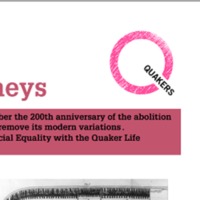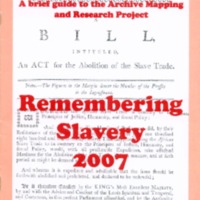
Quakers and the path to abolition in Britain and the colonies
The Society of Friends expressed its formal opposition to the slave trade in 1727, and from that date were vocal opponents of transatlantic slavery. A virtual exhibition of archived resources, ‘Quakers and the path to abolition in Britain and the colonies’, was launched online to commemorate the bicentenary. It traced the history of the anti-slavery movement from its Quaker beginnings and highlighted key events in the Quaker history of opposition to the slave trade, and was primarily based on material from the Library at Friends House. The exhibition also explained the important role played by Quaker women abolitionists through writing and poetry. The Quakers pioneered contemporary tactics such as boycotting, petitions, leafleting and poster campaigns.
Other resources to help people find out more about the bicentenary included ‘Abolition Journeys’, developed by Quaker Life Committee for Racial Equality with the Quaker Life Children and Young People’s Staff Team, designed to help people of all ages remember the slave trade and work to abolish its modern variations.

Remembering Slavery Archive and Mapping Project
Remembering Slavery 2007 involved museums, galleries and other cultural organisations across the North East of England in a programme of exhibitions, events, performances, lectures and activities to explore the themes of slavery and abolition, and identify connections with the region.
The Remembering Slavery Archive Mapping and Research Project, led by the Literary and Philosophical Society in Newcastle and assisted by local history groups, uncovered a large amount of archival material in the region’s institutions, exposing many hitherto unknown links between the North East and the slave trade. The participating record offices and libraries were Tyne and Wear Archives Service, the Literary and Philosophical Society Library, the Northumberland Record Office and the Robinson Library’s Special Collections at the University of Newcastle upon Tyne. This reassessment of the North East’s involvement in slavery and the slave trade led to new published research, including John Charlton's 'Hidden Chains: the Slavery Business and North East of England 1600-1865'. There was also a lecture programme at the Literary and Philosophical Society, including talks by Professor James Walvin. Several of the project volunteers published essays based on their research in 'North East History 39' (North East Labour History Society, 2008). The North East Slavery and Abolition Group was established among the project volunteers, and further work on slavery and abolition was included in the Society’s North East Popular Politics project (NEPPP), 2010-13. Much of the material found in the 2007 project has been loaded onto the NEPPP database.